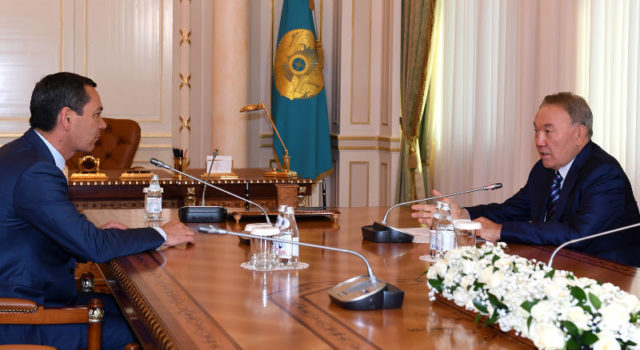
Nazarbayev’s Gambit on the Kyrgyz Election Chessboard: Reasons for Courting Omurbek Babanov
Publication: Eurasia Daily Monitor Volume: 14 Issue: 119
By:

In what seemed like an ill-considered move amid the highly tense pre-election atmosphere in Kyrgyzstan, President of Kazakhstan Nursultan Nazarbayev received the self-nominated presidential candidate Omurbek Babanov, in Almaty, on September 19. Babanov heads the Respublika opposition party and served as Kyrgyzstan’s prime minister in the years 2011 and 2012.
In televised footage, which showed only a fragment of the meeting, Nazarbayev, addressing his Kyrgyzstani guest in Kazakh, said: “I do not want to offend others. It is not our business. It is the internal affairs of Kyrgyzstan. I am not going to meddle in these matters… But I think, Kyrgyzstan needs a competent, young and experienced man like you” (Ktk.kz, September 19). The presidential elections in Kyrgyzstan are scheduled for October 15.
Nazarbayev’s words provoked a diplomatic backlash from officials in Bishkek, who in a strongly worded note of protest addressed to the Ministry of Foreign Affairs of Kazakhstan said that Kyrgyzstan viewed the meeting between Nazarbayev and Babanov “as an attempt to interfere in the internal affairs of the Kyrgyz Republic.” Astana responded rather clumsily: “Meetings with foreign political figures and leaders of political parties at their request are conducted regularly, and they fully conform to international practice” (Vb.kg, September 21).
Nazarbayev’s preference for Babanov, 47, over the other 12 officially registered presidential contenders, to be the future head of state of Kyrgyzstan may be due to the latter’s background. Babanov started his business career in 1995, as the director of a limited liability company in the city of Taraz, Kazakhstan. A few years later, Babanov moved to Kyrgyzstan as a representative of Shymkentnefteorgsintez JSC. He is believed to have developed strong ties with influential business circles in Kazakhstan, notably with the so-called “Eurasian trio” of Aleksandr Mashkevich, Patokh Shodiev and Alijan Ibragimov, as well as with lesser known groups of Russian oligarchs—heads of Russkaya Platina mining company and Nafta Moskva industrial financial group (For.kg, September 20).
Most importantly, Babanov’s calls for Eurasian economic integration and closer ties with Kazakhstan strike the right chord with Nazarbayev’s ambitions. Though, some of the other more radical electoral promises made by the young Babanov, including a crackdown on corruption, the “introduction of a new style of governance,” and constitutional reform to reintroduce presidential rule may be too daunting a challenge for Kazakhstan’s president (For.kg, September 20; Knews.kg, September 24).
After his talks with Nazarbayev, Babanov came under fierce attacks from various media outlets in Kyrgyzstan that lean toward the sitting president, Almazbek Atambayev (For.kg, September 20). Critics specifically accused him of scheming to sell out the country’s wealth to foreign oligarchs. Nevertheless, he is still widely recognized by many observers in Kyrgyzstan as the only opponent capable of defeating Sooronbay Zheyenbekov, the ruling Social Democratic Party of Kyrgyzstan (SDPK) nominee, who has been groomed by Atambayev.
Babanov recently formed a political alliance with Bakyt Torobayev, a contender put up by the Onugoo–Progress Party. The latter candidate has little political experience, but large crowds of supporters in southern Jalalabad province considerably increase his chances (RFE/RL, September 26). Babanov, though not a charismatic leader on the national scale, is a wealthy and prospering entrepreneur, actively involved in social projects like the construction of schools and kindergartens, which wins him a favorable public image in the country.
Babanov’s opponent from the ruling party, Sooronbay Zheyenbekov, apparently understands he cannot rely solely on administrative resources to win. The SDPK candidate has effectively secured the support of Kamchibek Tashiev, a nominee from the Ata Zhurt party, who on his recent tour of the Suzak district of Jalalabad province called on local voters to cast their ballots for Zheyenbayev. Furthermore, Tashiev announced he would drop out of the presidential race in favor of Zheyenbayev. The latter publicly thanked his supporter, noting Tashiev “did so without bargaining for a post” in a future presidential office (24.kg, September 20). Apparently, this comment alluded to Omurbek Babanov, who—in contrast—allegedly promised Bakyt Torobayev the post of prime minister for his support if Babanov is elected president.
It seems that President Atambayev’s domestic position is weakening due to both economic and political factors. The country badly needs foreign investment to revive the economy and create jobs. In September, Kyrgyzstan’s government had to cancel a $3 million contract with the Czech Liglass Trading Company, which is involved in building the Ak-Bulun and Naryn-1 hydroelectric power stations (Catoday.org, September 18). Last December, Atambayev told journalists that Vladimir Putin and Nursultan Nazarbayev had encouraged him to stay on as president upon the termination of his presidential term, but added at the same time that he felt tired (Zakon.kz, December 1, 2016). Much has changed since then. During the pre-election period, Atambayev eliminated his most vociferous opponents, Omurbek Tekebayev and Sadyr Japarov, sending them to jail for 8 and 11 years, respectively, and provoking international criticism (Times of Central Asia, August 3, 17). In this situation, Nazarbayev and Putin seem to have backed away from Atambayev and his political faction, in anticipation of next month’s election results.
The combination of all these factors creates fruitful ground for Omurbek Babanov in his election contest. But even though the election is only weeks away, nothing is clearly predictable in volatile Kyrgyzstan, where political friends and opponents constantly change sides.



